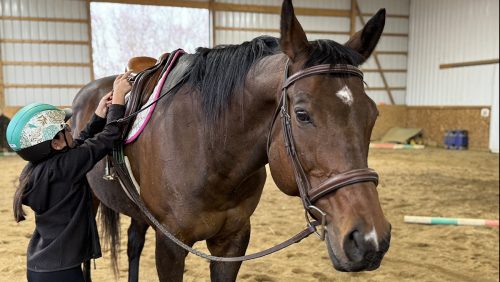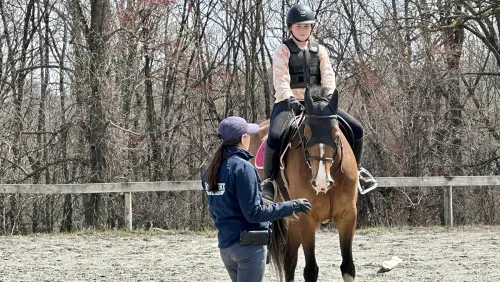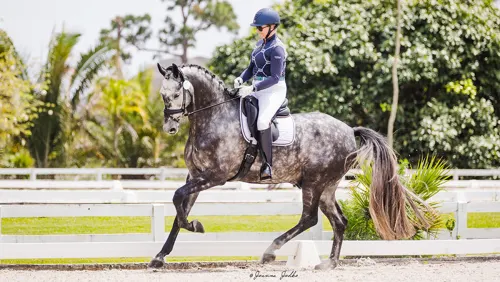The most popular pastime of anyone with credentials of any sort is “pin trading.” Credentialed officials, athletes and their entourage arrive with bucketloads pins featuring their country’s flag or organization’s logo and trade them for other country’s pins. Even if you can’t hold a conversation, you can trade pins and be friends. Pin trading fosters international understanding and mutual compassion, as “pin” is “pin” in English, Spanish and Portuguese. The pins decorate your credential’s lanyard and elevate you to the status of ubercool if you have a lot of great pins, or pathetic if you’re pin-free.
My colleges back in Middleburg had warned me about long days and hard-to-track down chef d’equipes, but why, oh why hadn’t they better prepared me for the Great Pin Trade? Where is my stash of Chronicle pins? Forget the 100 pounds of magazines I carted down, that sit molding next to the security desk after the head Colonel in charge of the base denied them entry, (deeming the Chronicle “propaganda”), what people wanted were pins, pins, by god, and lots of them.
When I was first asked to trade pins by a Brazilian press officer I explained my situation, adding my eagerness to acquire some, saying that they would make great “propinas,” or tips. The two press officers helping me at the desk stopped their work and stared at me as if I had three heads. “Propinas?” Well yeah, propinas. They shrugged and sort of raised their eyebrows at each other.
After a bit of confusion I came to realize that I’ve had that word wrong all these years, and that propinas actually means bribes, not tips. So yes, pins probably would make good bribes, but I’d prefer to use them as tips.
A few compassionate people had kindly gifted me pins, two to be precise, presumably in thanks for translating some urgent need like the location of a restroom or luncheonette. To these two pins I added to my flair by including my “Brilliant Too is Number One” button, an accoutrement much praised by many Cariocas. But really, you have to give something to get something, right? And I had nothing to give, really, aside from my two pins, and I wasn’t ready to give up my U.S. Equestrian Federation or Federation Equestre Internationale pin just yet.
I realized the depth of my problem at the media center, when the staff at the information desk conveniently failed to find a number for the taxi to call for me when I declined to trade pins. A small crowd surrounded me, staring at my USEF pin. “It’s very rare, you could probably get ten pins for it,” said someone enviously. I started to grow a bit uneasy as the pin-hungry gang all started touching my lanyard at once. “I’ll get more!” I promised, slowly backing towards the door. “I’ll come back tomorrow.” The ravenous crowd followed me step for step until I turned and ran out the door, through the pavilion and past the guards into the rain, finally hailing a taxi after a few anxious minutes.
That night I sent an e-mail to a staff member at the USEF, trying to keep the desperation out of my message as I begged her to bring me pins. I felt like I was asking for ration coupons, such was the importance of the pin.
ADVERTISEMENT
Thank goodness she brought me a handful the next day, and I felt my status start to rise as soon as she handed them to me. I was now in the pin-trading market.
My last pin trade came as a gesture of reconciliation after bad American-style behavior on my part. My patience as a translator and conduit for bad news for the press from the press office finally snapped yesterday, after an afternoon in which my services as a translator were in particularly high demand.
The victim of my annoyance was a volunteer I misunderstood. He was trying to tell me when the official results would be handed out, but who I thought was kicking us out of the pressroom in 20 minutes. (Honest, it made sense in context!) Until now, I had worked out bureaucratic problems with patience and some semblance of grace, but now I snapped. Annoyed by the prospect of bringing yet more bad news to the journalists, I launched into an ill-advised tirade about the nonsense we had put up with that day and throughout the week. When the poor volunteer managed to get a word in edgewise and explained that he was only trying to tell me when the results were coming and that we weren’t yet being kicked out of our workspace, I shut up.
Ten minutes later the volunteer returned to sit down next to me to chat about the format of three-day eventing. Like the other volunteers and staff, he wasn’t a horse person at all. After my performance earlier I knew I had to make up for my bad behavior, so I set my work aside to explain the ins and outs of cross-country to the volunteer. The conversation ended when he asked me to trade pins, and I knew that no hard feelings remained.
Ah the pin trade, who knows what other diplomatic possibilities it might facilitate? Maybe, with some coaxing, the pin trade really can help negotiate world peace.














